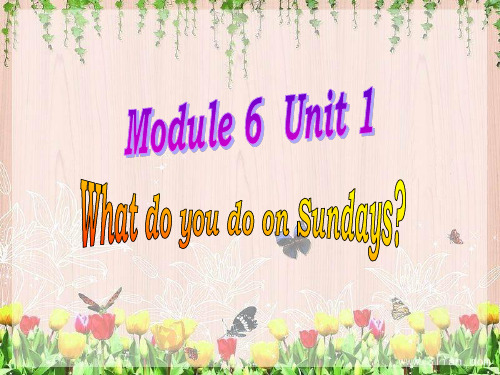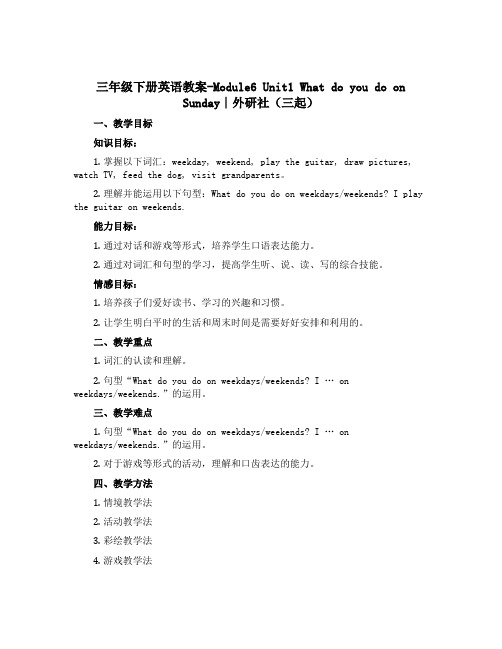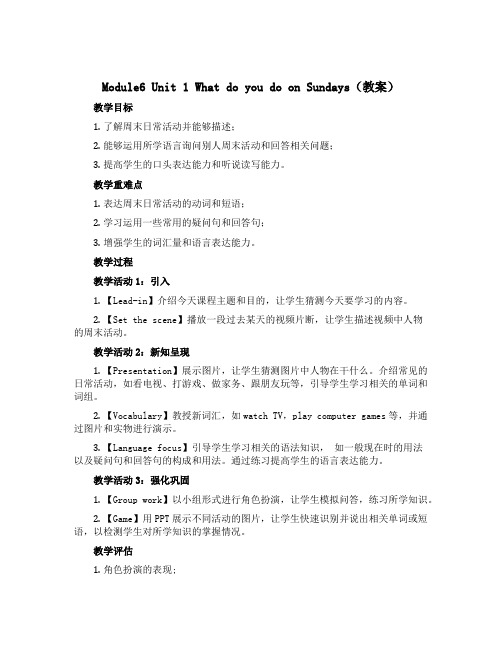Module-6-Unit-1-What-do-you-do-om-Sundays?-教学设计
三年级下册英语教学设计-Module 6 Unit 1《What do you do on Sund

三年级下册英语教学设计-Module 6 Unit 1《What do you doon Sunday》|外研社(三起)一、教学目标1.能够听懂、理解并使用句型“What do you do on Sunday?”询问别人平时在周日做什么。
2.能够流畅地说出自己在周日的活动安排,并与同学进行互动交流。
3.能够理解并正确运用本单元的词汇、表达和句型,提高英语交际能力。
二、教学重点及难点教学重点:1.能够流畅地使用“What do you do on Sunday?”这一句型进行交流。
2.能够让学生能够正确理解和应用本单元的词汇和表达。
教学难点:1.让学生能够积极参与英语交流,提高口语表达能力。
2.让学生能够加深对话题的理解和认识,提高听力和阅读能力。
三、教学过程1. 课前准备1.教师准备所需的教学资料和教具。
2.准备活动,以激发学生对话题的兴趣,如手抽奖、填空游戏等,为整堂课打下良好的气氛。
2. 导入新课1.教师用“What do you do on Sunday?”这一句型与学生互动交流,引入本课的话题。
2.教师出示图片,让学生们谈论周日应该做些什么活动,以此激发学生们对话题的兴趣,同时提高听力和口语表达能力。
3. 听力训练1.教师播放录音,让学生听录音内容并回答问题,以检测和提高听力和阅读能力。
2.教师为学生分发对话内容,引导学生们进行听力和阅读训练,并加深对话题的理解和认识。
4. 口语表达1.学生们上台展示自己在周日的活动安排,练习使用“What do you do on Sunday?”这一句型进行交流,同时为学生们提供展示自己和扩展交际话题的机会。
2.教师根据学生的展示情况,提供一些改进建议和反馈,以提高学生的口语表达能力。
5. 词汇和语法训练1.教师设置考察能力的小测验,以检查学生们的词汇和语法掌握情况,并对不理解的知识点进行解释和补充。
2.教师与学生一起复习并强化本单元出现的词汇和表达,以加深学生们对知识点的掌握和理解。
新标准英语Module6_unit1_What_do_you_do_on_Sundays?

学以致用跟跟看
• What do you do on Sundays? • I go swimming . • What do you do on Mondays? • I play football . • What do you do in the morning? I sleep . • What do you do in the afternoon? I watch TV .
A: What do you do in the afternoon?
B: I _____________ in the afternoon.
今天我们学会了如何用英语谈论有关周末活动的情况。课 后,请你调查一下你的家人和朋友一周的活动情况,并介绍给 你的同学听。 What do you do on Mondays/Saturdays/Sundays…? I .
[mæθs]
数学
art
[ɑːt]
美术
PE=physiczɪkl]
[,edʒu'keɪʃn]
体育
science
['saɪəns]
科学
Sunday
→
What do you do on Sundays?
play football
play basketball
[wɒtʃ]
[,tiː'viː]
电视
看电视
have [hæ v]
做;进行,从事
has
[hæ z]
(have的第三人称单数形式)做,进行,从事
class
[klɑːs]
课,班级
today
[tə'deɪ] 今天
music
['mjuːzɪk]
三年级下册英语教案-Module6Unit1WhatdoyoudoonSunday∣外研社(三起)

三年级下册英语教案Module6 Unit1 What do you do onSunday∣外研社(三起)教学内容本单元为外研社三年级下册英语Module6 Unit1,主题为"What do you do on Sunday?",主要教学内容包括:1. 词汇:学习与周末活动相关的单词,如read, write, play,go等。
2. 句型:使用"What do you do on Sunday?"来询问周末活动,并能用"I read books."等句型进行回答。
3. 语法:复习一般现在时态,重点练习动词原形。
教学目标1. 知识目标:学生能够听懂、会说、会读本单元单词和句型,并能用所学句型询问和回答周末活动。
2. 技能目标:学生能够在真实语境中运用所学句型和单词,提高英语交际能力。
3. 情感目标:培养学生对英语学习的兴趣,提高学生的合作意识。
教学难点1. 单词的记忆与运用。
2. 句型的正确运用。
3. 语法点的正确使用。
教具学具准备1. 教具:PPT、录音机、单词卡片。
2. 学具:学生自备英语课本、练习本。
教学过程第一课时1. 导入:通过问答游戏,引导学生复习上一单元内容,导入新课。
2. 新课呈现:通过PPT展示本单元单词和句型,引导学生学习。
3. 操练:通过小组活动,让学生练习本单元句型和单词。
4. 巩固:通过游戏活动,巩固本单元所学内容。
第二课时1. 复习:通过问答游戏,复习上一课时内容。
2. 新课呈现:通过PPT展示本单元句型和语法点,引导学生学习。
3. 操练:通过小组活动,让学生练习本单元句型和语法点。
4. 巩固:通过游戏活动,巩固本单元所学内容。
板书设计第一课时Module6 Unit1 What do you do on Sunday?词汇:read, write, play, go句型:What do you do on Sunday? I read books.第二课时Module6 Unit1 What do you do on Sunday?语法:一般现在时态句型:What do you do on Sunday? I read books.作业设计1.抄写本单元单词和句型,每个单词写五遍,句型写三遍。
三年级下英语教案-Module6Unit1WhatdoyoudoonSundays|外研版(三起)

三年级下英语教案Module 6 Unit1 What do you do onSundays|外研版(三起)教学内容本课为外研版(三起)三年级下册英语Module 6 Unit 1的内容。
课程主要围绕日常活动的话题,通过询问和回答周日活动的句型,让学生掌握用英语描述自己日常生活的能力。
教学内容包括新单词的学习,如 "usually"、"often"、"always" 等频率副词,以及相关句型的操练,如 "What do you usually do on Sundays?" 和 "I usually"。
教学目标1. 知识目标:学生能够听懂、会说、会读本课的生词和句型,并能运用这些词汇和句型描述自己在周日的日常活动。
2. 能力目标:通过本课的学习,学生能够提高自己的英语听说能力,并能在实际情景中灵活运用所学知识。
3. 情感目标:培养学生对英语学习的兴趣,增强他们用英语进行日常交流的信心。
教学难点1. 词汇记忆:新单词的发音和拼写是学生需要克服的难点,特别是频率副词的正确使用。
2. 句型运用:学生需要理解并正确运用询问和描述日常活动的句型。
3. 实际应用:鼓励学生将所学知识应用到实际生活中,用英语描述自己的周日活动。
教具学具准备1. 多媒体设备:用于播放课文录音和展示PPT。
2. 单词卡片:用于新单词的教学和复习。
3. 活动表格:用于学生记录和分享自己的周日活动。
教学过程第一阶段:导入教师活动:通过展示一些日常活动的图片,引导学生用中文描述这些活动。
学生活动:观察图片,用中文描述所见活动。
第二阶段:新知识学习教师活动:呈现单词卡片,教授新单词的发音、拼写和意义。
学生活动:跟读单词,模仿发音,记忆拼写。
第三阶段:句型练习教师活动:利用PPT展示句型,并通过角色扮演的方式展示句型的使用。
学生活动:听录音,模仿句型,进行小组对话练习。
三年级下册英语教案-Module6 Unit1 What do you do on Sunday∣外

三年级下册英语教案-Module6 Unit1 What do you do onSunday∣外研社(三起)一、教学目标知识目标:1.掌握以下词汇:weekday, weekend, play the guitar, draw pictures, watch TV, feed the dog, visit grandparents。
2.理解并能运用以下句型:What do you do on weekdays/weekends? I play the guitar on weekends.能力目标:1.通过对话和游戏等形式,培养学生口语表达能力。
2.通过对词汇和句型的学习,提高学生听、说、读、写的综合技能。
情感目标:1.培养孩子们爱好读书、学习的兴趣和习惯。
2.让学生明白平时的生活和周末时间是需要好好安排和利用的。
二、教学重点1.词汇的认读和理解。
2.句型“What do you do on weekdays/weekends? I … onweekdays/weekends.”的运用。
三、教学难点1.句型“What do you do on weekdays/weekends? I … onweekda ys/weekends.”的运用。
2.对于游戏等形式的活动,理解和口齿表达的能力。
四、教学方法1.情境教学法2.活动教学法3.彩绘教学法4.游戏教学法五、教学过程1. Warming up1.Greet the students and ask them about their weekends.2.Ask students to stand up and stretch their arms and legs, then sit down and get ready for the class.2. Presentation1.Ask students to look at the pictures on page 44 of the textbook and tell the teacher what they see.e the attached flashcards to teach the words “weekday”, “weekend”, “play the guitar”, “draw pictures”, “watch TV”, “feed the dog”, and “visit grandparents”.3.Ask students to repeat the words after the teacher and identify the words’ meanings using the pictures.3. Practice1.Show the students a flashcard and ask, “What do you do on weekdays/weekends?” Students can answer with actions such as “I st udy on weekdays.” or “I play with my friends on weekends.” Repeat to practice the sentence structure and help students remember the vocabulary.2.Play a game called “What I like to do” where students write in a blank space what they enjoy doing in their free time, then read it aloud to the class. Afterwards, ask students to stand up and read out their classmates’ hobbies with actions.3.Divide the class into small groups and ask them to use the given vocabulary to create a story about what they did on the weekend. Afterwards, a representative from each group shares their story with the whole class.4. Production1.Ask students to work in pairs and practice the sentence structure “What do you do on weekdays/weekends? I … on weekdays/weekends.” and use the given vocabulary words to make sentences.2.Have the students fill out a worksheet with pictures of each of the new words and they must write sentences using the sentence structure taught in class.3.The students are to draw a picture of what they like to do ontheir weekends and share it with the class.5. Consolidation1.Review the new words, sentence structure, and the pupils’ production.2.Call on a couple of students to share one thing they learned today.3.End the lesson by telling the students the importance of using free time wisely.六、Homework1.Review the vocabulary and sentence structure taught in today’s class.2.Share with parents what we learned today and ask them to share their favorite activity with the student.3.Draw a picture of the favorite activity shared by their parents.七、Blackboard design1.Vocabulary: weekday, weekend, play the guitar, draw pictures, watch TV, feed the dog, visit grandparents。
三年级下册英语说课稿-Module 6 Unit 1 What do you do on Sunda

三年级下册英语说课稿-Module 6 Unit 1 What do you do onSundays. |外研社(三起)一、教学目标•语言知识目标:学会并能正确使用本单元所涉及的日常活动动词,如do homework,watch TV等。
•语言技能目标:能运用目标语言造句,谈论自己和他人在周末的活动内容。
•语言情感目标:培养学生对英语学习的兴趣,增强学生的自信心和自主学习能力。
二、教学重点•学会并能正确使用本单元所涉及的日常活动动词。
•能运用目标语言造句,谈论自己和他人在周末的活动内容。
三、教学难点•掌握英语句式中使用的一些介词,如in、at等。
•能够就日常活动的时间及持续时间进行表达。
四、教学过程A.导入新课1.Greeting(问候)Hello, boys and girls. How are you today?2.Review(复习)(1)Ask some questions about Unit 1-5,for example:What’s in the park? There is a big tree in the park.(引出该单元的主题)(2)Play a game “Simon says” with the target sentences in Unit 1-5 and some TPR.B.学习新课1.Presentation(呈现)(1)Show some pictures and say “What do you do on Sundays?”(呈现主题)(2)Listen to the recording and repeat.(3)Watch the VCD and ask some questions about the pictures. For example: “What’s he doing? What are they doing? Where are they?”(4)Teach the new words and expressions and make sure the students can say them correctly.2.Practice(练习)(1)Work in pairs. Ask and answer about what they do on Sundays. For example: A: What do you do on Sundays? B: I watch TV.(2)Complete the sentences with the correct words or expressions according to the pictures.(3)Role-play the conversation in pairs.(4)Listen to the “Let’s talk”and repeat. Make a dialogue with the teacher.C.巩固展示1.Sin g a song “On Sunday.”2.Show time (展示时间)(1)Show pictures of some activities and ask the students to say what they are.(2)Ask some students the time of some activities.如:When do you get up? I get up at seven o’clock.(3)Sum up the sentences with the time and the activities together, and write them on the blackboard.D.作业1.Copy the new words and expressions in the notebook.2.Draw a picture of what you do on Sundays and write a sentence about it.五、板书设计时间(When)活动(Activity)7:00get up8:00have breakfast9:00watch TV……动词: get up, have breakfast, watch TV, do homework, play the guitar, draw, paint, read books, play with friends, play computer games.六、教学反思在教学过程中,我注意到一些孩子对英语学习不是很感兴趣,于是就给他们丰富的图片和多样的游戏,让他们在感受语言魅力的同时,更好地掌握英语的学习方法,提高英语学习的自信。
三年级下册英语教案-Module6Unit1WhatdoyoudoonSunday|外研社(三起)

三年级下册英语教案Module6 Unit1 What do you do onSunday|外研社(三起)教学内容本节课为外研社三年级下册英语第六模块第一单元,主题为"What do you do on Sunday?"。
教学内容主要包括日常活动词汇,如"watch TV", "read books", "play football"等,以及询问他人周末活动的句型"What do you do on Sunday?"。
课程旨在通过情景对话和实践活动,帮助学生掌握相关词汇和句型,并能运用到实际交流中。
教学目标1. 知识目标:学生能够听懂、会说、会读本节课的重点词汇和句型。
2. 能力目标:学生能够在真实情景中运用所学词汇和句型进行交流,提高英语口语表达能力。
3. 情感目标:培养学生对英语学习的兴趣,增强合作意识和交流能力。
教学难点1. 词汇的记忆与应用,特别是动词短语的使用。
2. 句型的正确构造与在实际情景中的灵活运用。
3. 学生对于不同文化背景下周末活动的了解与表达。
教具学具准备1. 多媒体课件:包括单词卡片、情景图片、动画视频等。
2. 实物道具:与活动相关的玩具或模型,如小书本、足球等。
3. 练习材料:单词和句型的练习册、活动表格等。
教学过程1. 导入:通过播放关于周末活动的动画视频,吸引学生的注意力,引入主题。
2. 新授:利用多媒体课件展示新词汇和句型,结合实物道具进行讲解和示范。
3. 练习:组织学生进行角色扮演、小组讨论等互动活动,巩固所学知识。
4. 巩固:通过游戏、竞赛等形式,检测学生对词汇和句型的掌握程度。
板书设计1. Module6 Unit1 What do you do on Sunday?2. 词汇表:列出本节课的重点词汇,如"watch TV", "read books"等。
Module6 Unit 1 What do you do on Sundays(教案)外研版(三起

Module6 Unit 1 What do you do on Sundays(教案)教学目标1.了解周末日常活动并能够描述;2.能够运用所学语言询问别人周末活动和回答相关问题;3.提高学生的口头表达能力和听说读写能力。
教学重难点1.表达周末日常活动的动词和短语;2.学习运用一些常用的疑问句和回答句;3.增强学生的词汇量和语言表达能力。
教学过程教学活动1:引入1.【Lead-in】介绍今天课程主题和目的,让学生猜测今天要学习的内容。
2.【Set the scene】播放一段过去某天的视频片断,让学生描述视频中人物的周末活动。
教学活动2:新知呈现1.【Presentation】展示图片,让学生猜测图片中人物在干什么。
介绍常见的日常活动,如看电视、打游戏、做家务、跟朋友玩等,引导学生学习相关的单词和词组。
2.【Vocabulary】教授新词汇,如watch TV,play computer games等,并通过图片和实物进行演示。
3.【Language focus】引导学生学习相关的语法知识,如一般现在时的用法以及疑问句和回答句的构成和用法。
通过练习提高学生的语言表达能力。
教学活动3:强化巩固1.【Group work】以小组形式进行角色扮演,让学生模拟问答,练习所学知识。
2.【Game】用PPT展示不同活动的图片,让学生快速识别并说出相关单词或短语,以检测学生对所学知识的掌握情况。
教学评估1.角色扮演的表现;2.答题游戏的正确率;3.老师对学生的听说读写能力进行评估。
教学拓展1.在家里练习描述周末活动,为下节课交流提供素材;2.结合视频或图文材料,扩展不同地区、不同文化的周末活动内容,拓宽学生的视野;3.了解学生个体差异,根据个体需要对学习进度进行合理调整。
Module6Unit1What...

Module6Unit1What...Module 6 Unit 1 What do you do on Sundays 教案1教学目标(1)询问他人的在学习上的课程;回答他人对自己所上课程的询问:What do you have at school?I have English / English/ Maths / Science.(2)询问他人的周末活动;回答他人对自己周末活动的询问:What do you do at the weekend?I go swimming / play football / sleep.教学重点与难点教学重点:能询问他人的学校课程及周末活动;能回答他人对自己所上课程及周末活动的询问。
教学难点:能较熟练地运用新学的单词和句子对课程和周末活动进行问答。
教学准备及手段复读机、配套磁带、录音磁带、卡片、课程评价表和星星、课本(语文、数学、英语和科学)。
教学流程一、组织引入:1、Greeting.2、出示课程评价表,说明使用方法二、新知学习1、句子What do you have at school? I have...的学习活动:①学说What do you have at school? I have English.(动作节奏、实物)②学说Maths, Science, Chinese,并用实物(课本)引入句子。
③开火车。
④同时出示两本课本让学生自己说出句子,chant。
⑤学生小组进行轮流问答操练。
⑥小组挑战赛:教师示范,小组挑战,并评价。
活动要求:每组请一名同学出示课本全组齐问另一个组的同学,然后根据这个组同学的回答。
三年级下册英语教案-Module 6 Unit 1 What do you do on Sunday

三年级下册英语教案-Module 6 Unit 1 What do you do onSundays教学目标•学会问和回答关于周末活动的问题•了解单词weekend, play和go的意思•学会用现在进行时描述正在进行的活动教学重点•学会用“what do you do on Sundays”这个问句询问他人关于周末活动•学会使用一些常见的周末活动词汇,如play和go•学会用现在进行时描述正在进行的活动教学难点•学会用现在进行时描述正在进行的活动教学准备•教师:黑板、彩笔、教材•学生:教材教学过程Step 1 导入新课1.让学生自由讨论一下他们喜欢在周末做什么,然后让他们分享他们的答案。
Teacher: What do you like to do on weekends? Can you talk about it with your friends?2.教师扩展与学生的对话,扮演学生分享的活动的角色,引入课程:Teacher: I like to play with my friends on weekends. Do you like to play on weekends too? Today we will learn about weekend activities.Step 2 了解新课1.通过展示图片,板书,组合单词和口语练习,让学生理解周末常见的活动词汇,包括go, play等。
Teacher: Now let’s learn some words. Look at these pictures and match the words. (展示图片:play games, go swimming, watch TV, read books, play football) Great! Which word do you know?2.通过教材让学生看图,回答与图片相关的问题,以及通过比较了解不同画面的异同,让学生加深对新课内容的理解。
Module-6-Unit-1-What-do-you-do-on-Sundays?习题教案资料

4.A:What do you do on Sundays?
B: I________ on Sundays.
A.go swimming B.play football C.watch TV D. fly a kite
三、
四、为了解目前大学生对DIY手工艺品制作的消费情况,我们于己于人2004年3月22日下午利用下课时间在校园内进行了一次快速抽样调查。据调查本次调查人数共50人,并收回有效问卷50份。调查分析如下:改错并在横线处写上正确的句子。
1.
2.标题:手工制作坊2004年3月18日What doyoudoinSaturday? ( )
五、翻译下列句子。
1.你在周日做什么?
调研课题:
2.
3.3.www。oh/ov。com/teach/student/shougong/I play the football on Sunday.
4.I go to school on Tuesday.
2.A:What do you do on Sundays?
B: I ________ on Sundays.
A.go swimming B.play football C.watch TV D. fly a kite
3.A:What do you do on Sundays?
B:I________ on Sundays.
5.月亮________________6.居住_____________________________
二、根据提示进行选择。
1.A:hat do you do on Sundays?
Module-6-Unit-1-What-do-you-do-on-Sundays

Module 6 Unit 1 What do you do on Sundays?新标准英语三年级起点三年级下册(2012版)【教学目标】知识目标:要求学会的单词on Sundays、go swimming、eat、sleep、watch TV,能够灵活运用句子What do you do on Sundays ? 和What do you do in the morning/afternoon?及做出相应的回答。
能力目标:学会询问他人的周末活动,回答他人对自己周末活动的询问。
情感目标:让学生拥有一个健康向上的周末活动,通过学生小组合作、讨论、交流,让学生感受把所学知识融会到实际交往中的乐趣,培养学生浓厚的英语兴趣,从而激发积极的学习情感。
【教学重点】教学重点:单词:Sunday、go swimming、eat、sleep、watch TV 句子:What do you do on Sundays?What do you do in the morning/afternoon?【教学难点】运用What do you do on Sundays ? 和What do you do in the morning/afternoon?把所学知识融入到实际交往中。
【教学准备】点读笔,单词卡, 课件【教学过程】Step1. Warm up: 1. Greetings.T: Good morning! Are you happy today?2. Chant:(T: Do you like chant? OK, let’s chant together.)football, football, play football basketball, basketball, play basketball. table tennis, table tennis, play table tennis. swimming, swimming, go swimming. shopping, shopping, go shopping. homework, homework, do my homework.bike, bike, ride a bike. TV, TV, watch TV. school, school, go to school. Step2. Presentation and practice: 1. Lead inT:Thank you! Sit down, please. Today, let’s have a competition. If you do a good job. You can get one point. T: What’s this? S: It’s a cat. T: What’s she doing? S: She’s eating meat. 引出eat 教授.2. Look! A dog is coming! There is an interesting story about them. Let’s look and listen. After listening, tell us. Does the dog ride a bike on Mondays? 今天,有只小猫和一只小狗发生了一个小故事,你们想知道吗?Now, let’s watch.T: Class, on Mondays, I go to school. Do you go to school on Mondays? S: Yes, I do.T: Do you go to school on Saturd ays? S: No, I don’t.T: What do you do on Saturdays? S: ...3. T: Here’s a calendar. Can you say the days of the week?在此渗透中西时间的差异,在中国每周的第一天是周一,而在国外每周的开始是周日。
Module6Unit1WhatdoyoudoonSunday?(教案)外研版(三起)英语三年级下册

教案:Module 6 Unit 1 What do you do on Sunday?一、教学目标1. 知识目标(1)能够听懂、会说、会读本节课的生词和重点句子。
(2)能够运用所学知识询问和回答关于日常活动的问题。
2. 能力目标(1)能够用英语简单描述自己的日常活动。
(2)能够听懂并参与关于日常活动的对话。
3. 情感目标培养学生的合作意识,使学生更加热爱生活,关注自己的日常活动。
二、教学内容本节课主要教学内容为Module 6 Unit 1 What do you do on Sunday? 的课文内容,包括日常活动词汇的学习,以及询问和回答关于日常活动的问题。
三、教学重点与难点1. 重点:能够听懂、会说、会读本节课的生词和重点句子,能够运用所学知识询问和回答关于日常活动的问题。
2. 难点:能够运用所学知识描述自己的日常活动,并能听懂并参与关于日常活动的对话。
四、教具与学具准备1. 教具:PPT、录音机、磁带、单词卡片、图片等。
2. 学具:课本、练习册、单词卡片、画笔等。
五、教学过程1. 导入:通过歌曲导入,让学生跟着歌曲一起唱,激发学生的学习兴趣。
2. 新课呈现:通过PPT展示本节课的生词和重点句子,让学生跟读,并解释单词和句子的意思。
3. 课堂活动:通过小组活动,让学生互相询问并回答关于日常活动的问题,培养学生的合作意识。
4. 巩固练习:通过PPT上的练习题,让学生巩固所学知识。
六、板书设计板书设计如下:What do you do on Sunday?I read books.She watches TV.He plays basketball.We go shopping.七、作业设计1. 抄写本节课的生词和重点句子。
2. 运用所学知识,写一篇关于自己日常活动的短文。
八、课后反思本节课通过歌曲导入、小组活动等形式,让学生在轻松愉快的氛围中学习了日常活动词汇和句子。
在教学过程中,要注意关注每一个学生,确保他们都能够掌握所学知识。
三年级下册英语说课稿-Module 6 Unit 1 What do you do on Sunda

三年级下册英语说课稿-Module 6 Unit 1 What do you do onSundays1-外研社(三起)一、教学目标1.知识目标:a.能够听、说、认读单词:Sunday, Saturday, park, museum, cinema, computer, game, friend。
b.能够理解并朗读句子:“What do you do on Sundays? I go to the park.”, “What does he/she do on Saturdays? He/She goes to the museum/cinema/computer games.”2.能力目标:a.能够听懂并回答问题。
b.能够描述自己和别人周末的安排。
3.情感态度:a.培养学生交流和分享的能力。
b.让学生学会合作、积极参与课堂活动。
二、教学重难点1.教学重点:a.听、说、认读单词。
b.学会用英语描述周末的活动。
2.教学难点:a.学会用第三人称单数谈论别人的周末安排。
b.能够听懂并回答复合句子。
三、教学准备1.课件。
2.单词卡片。
3.音频设备。
4.小组活动使用的教具。
四、教学过程1. 导入新课1.让学生听一段英文歌曲,并跟着唱。
2.引导学生谈论周末的活动,如看电影、玩电脑游戏、去博物馆、去公园、和朋友出去玩等。
2. 学习新知识1.教师出示图片或单词卡片,并让学生读出该单词并跟读。
2.告诉学生如何用英语描述周末活动。
a.What do you do on Sundays? I go to the park.b.What does he/she do on Saturdays? He/She goes to themuseum/cinema/computer games.3.让学生听录音并模仿。
3. 合作学习1.分小组。
2.由一名组员使用英语描述自己的周末活动,其他组员进行回答和提问。
3.让其他小组评价描述活动的同学的英语表达是否准确、流利。
- 1、下载文档前请自行甄别文档内容的完整性,平台不提供额外的编辑、内容补充、找答案等附加服务。
- 2、"仅部分预览"的文档,不可在线预览部分如存在完整性等问题,可反馈申请退款(可完整预览的文档不适用该条件!)。
- 3、如文档侵犯您的权益,请联系客服反馈,我们会尽快为您处理(人工客服工作时间:9:00-18:30)。
Module 6 Unit 1 What do you do om Sundays? 教学设计
长海县小长山小学姜振聪
教学目标:
知识技能目标:
1.全体学生能听懂、能说:What do you do on Sundays? .理解:on,Sunday,park,great,goal,hooray.运用、认读:on,Sunday,park.
2.部分学生能运用、认读: great,goal,hooray.
3.能运用所学句型调查本组同学周末的活动,成立活动小组,邀请更多同伴一起参加。
学习策略目标:
积极运用所学英语进行表达和交流。
情感态度目标:
乐于感知并积极尝试使用英语进行口头交流。
内容分析:
本单元的话题是谈论周末活动安排,重点学习“What do you do on Sundays?”语句结构,围绕着“周末活动安排”这个话题开展多种讨论活动。
强化学生对句型的掌握,促进学生语言实际运用的能力的提高。
学情分析:
小学二年级的学生正是玩心重的时候,周末活动安排对他们来说再熟悉不过,由于现在孩子的业余生活很丰富,所以课堂上除了play
football,go swimming等dance,play ping-pong也让学生初步用英语感知,并且尽量多准备一些活动和游戏,调动他们积极主动参与学习。
使其在活动中主动掌握和运用所学语言。
教具准备:
CD-ROM , PPT , cards .
教学过程:
OK! Class begins .
Step 1 Warm-up and lead-in
1.Greetings to the students.
2.Show the pictures
of(...)look at the picture and say the phrase.(Ss:play basketball/play football/go swimming... ”)
3.Show the picture of SB Unite1,take a look and listen and answer the question “Do they like football?”
4.Listen,point and say.
Step 2 Task – presentation
今天我们要跟Sam 和 Daming 一起学习如何介绍自己周末的活动安排并询问他人的安排。
学完之后我们要展开调查(Do a survey)找到和自己有相同安排的同学。
Step 3 Text –learning
1.CD-ROM , think over : Do they like football? Sam和Daming 喜欢踢足球吗? (师板书Module6 Unite 1)
SS:…
2. Open the books , listen to the text again , and think over the questions :
What does Sam/Daming do on Sundays? When do they play football?(help them know the meanings )
A.Teach the new words and key sentences:on, Sunday(出示日历标明一周七天的英语单词、帮助学生认识理解), on Sundays,What do you do on Sundays?I ...(师补充板书What do you do on Sundays?
I...)
B.Do a chant ,work in 3.
S1:On Sundays,I go to the zoo.On Sundays,what do you do? What do you do ?
S2:On Sundays,I go to the zoo,too.
S3:On Sundays,I go to the zoo,too.
Ss:On Sundays,wego to the zoo.We go to the zoo.We go to the zoo.Tweet,moon,coo,roar.(模仿动物叫声)
3. After listening , ask them to answer .
a.Where does Sam play football?
S1 :At the park.(回答时头戴头饰),
Teach the new words park,great,goal,hooray
4.Listen and repeat after the tape.
5.Imitate the pronunciation and intonation.
6.Practise reading in 2.
Step 4 Practice
1.Activity3
Listen to the tape and repeat,then retell the dialogue and act out the dialogue.
2.Part 4
a.Talk about the pictures,pair work.
T: 如果你能说出一幅图,涂一个星;说 2 幅图,涂二个星;所有的图片,涂三个星
b.Act out the dialogue.
Step 5 Task completion
T:Now let’s finish today’s task , let’s do a chant ,try to ask sb“What do you do on Sundays?”and find the same,then make a team and say“let’s ...gother.”
Step6 Summary and Homework
1.T: What have we learnt today ?
2. Homework
必做:
1.认读单词
2.听读课文,模仿语音语调。
选做:
询问更多朋友周日的活动安排。
